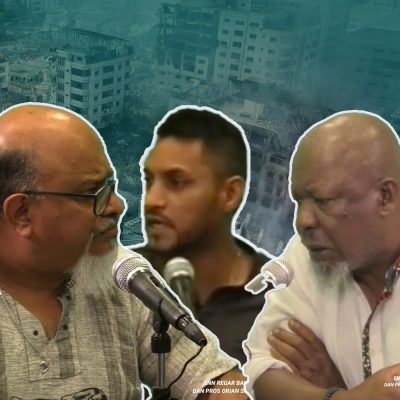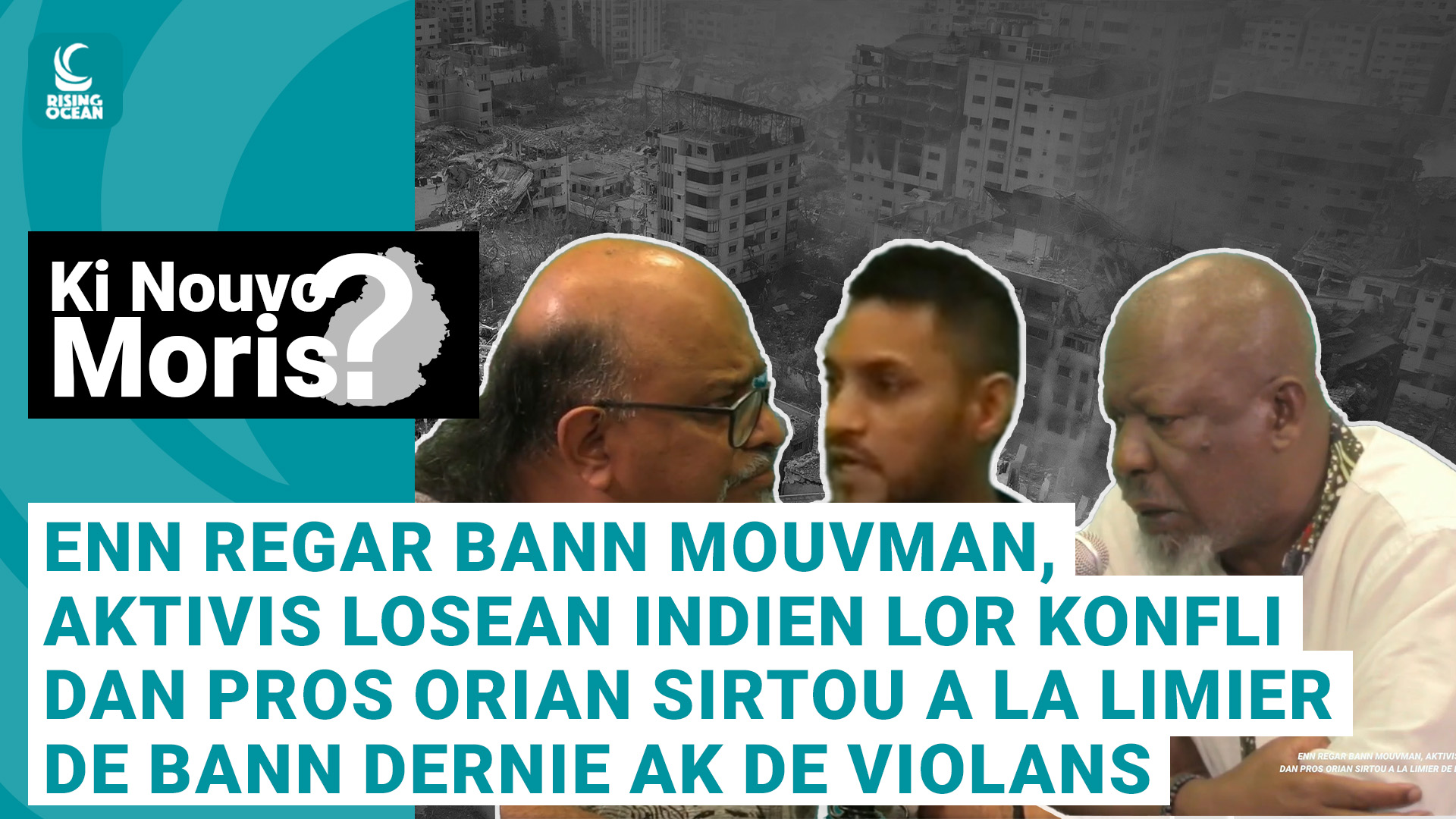The Israeli-Palestinian conflict is not new, it is a genocide that has lasted more than 75 years, and it is by far the most murderer war the world has known. The situation is unprecedented because the attacks are causing thousands of deaths and the 5,000 mark has been crossed since the beginning of the conflict. In addition, civilians are being killed in large numbers and public infrastructure such as hospitals and schools are being bombed. At this time, it is essential to opt for an immediate ceasefire and allow humanitarian organizations to enter their war zones to help the population affected by these conflicts. To address this topic, Rising Ocean brought together several activists from different islands in the Indian Ocean to hear their views on the Israeli-Palestinian genocide. The ki nouvo moris set had as guests Alain Tolbize, Ashok Subron, Daniella Maillot and Zo Randriamaro. The debate was hosted by Ashvin Gudday.
Daniella Maillot, who is the spokesperson for the association Réunion Palestine, describes the conflict between Israel and Palestine as genocide and war crimes.
“The situation is very dramatic and for the association it is first and foremost an ethnic cleansing.”
The association held two rallies to show their support for the Palestinians and Danielle Maillot points out that it was not easy because in the first instance, they did not receive the authorization from the prefecture to be able to move forward with the procedures, however, after the decision of the administrative court, the ban was lifted. During this march, the collective renewed their support for the Palestinian people, and they demanded an immediate ceasefire in Gaza, where several hospitals are under bombardment and are subject to shortages and power cuts.
“Our fear is that it will flare up all over the Middle East and that it will spread to the world.”
The Israeli-Palestinian conflict has its roots in colonial dominance but also in the way the colonial powers see and want to run the world. Knowing the history is paramount to knowing how the British powers are at the root of the conflict between the Israelis and the Palestinians. It is important to know that the Balfour Declaration, statement on November 2, 1917, changed the history of the Middle East in an extremely serious way, declares Ashok Subron. Indeed, this statement, which was later included in the British Mandate over Palestine, mentioned that the British supported the settlement of Jewish people in Palestine.
“The Israeli state is an ethno-integrist state because it is only those belonging to the Jewish community who are granted nationality, and it is important to recognize that what is happening is the cause of imperialization and colonization.”
Since the West demarcated the Palestinian territory, nothing has really changed, except the situation is more and more catastrophic given that the population, the civilians are being bombed on a large scale. For Alain Tolbize, this is the result of the colonization that the countries of the East have known. Indeed, the Palestinian people are facing what could be called a modern colonization because the Palestinian state existed long before the Israeli state was established and recognized by the powers of America. As a matter of fact, it is an ethnic cleansing that is happening in Palestine, and Palestinians are forced to leave their countries and their lands or face death, says Alain Tolbize. Although many people on both sides are being killed in this war, however, Palestine is protecting itself from the invaders and this form of resistance to oppression and domination is remarkable.
“It’s not a conflict, it’s a massacre because children, women and the elderly are being killed, defenseless people are being massacred and left with no resources to survive. What is important now is an immediate ceasefire, and it is unfortunate that the world bodies have not shown their support for Palestine by voting for the ceasefire.”
For her part, Zo mentions that the Indian Ocean must be solider to the Palestinian people. Due to the colonial passes that the islands of the Indian Ocean have experienced, it is essential to support Palestine in its resistance against a new colonization by the Israelis but also not to consent to massacre itself as the major international bodies do. Decolonization and self-determination are important for the good governance of a state, says Zo.
“Madagascar, for its part, stands in full solidarity with the Palestinians because the genocidal apartheid regime that Israel is imposing on Palestine is no different from the invasion and colonization that Madagascar experienced at the end of the 1940s. Certainly, Madagascar has an intimate understanding of the workings of the imperial war machine.”
Indeed, it is not only the geopolitical factor that comes into play when there are wars, but also access to resources. For instance, the foreign forces that are helping Israel in this genocide, whether economically or militarily, are also in Madagascar and it is for a question of resources. Many of its international organizations operate mines where they extract elements that will help in the manufacture of military and war products.
“We are convinced that resistance is truly vital and that it is important to prepare for this second process of decolonization that must be initiated.”


